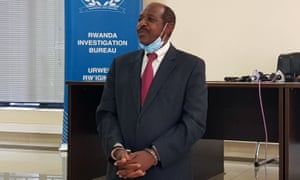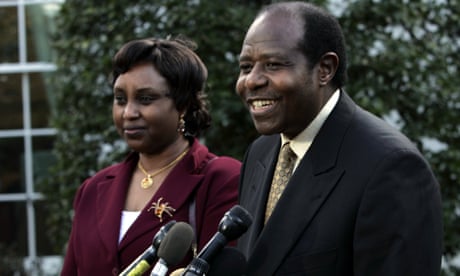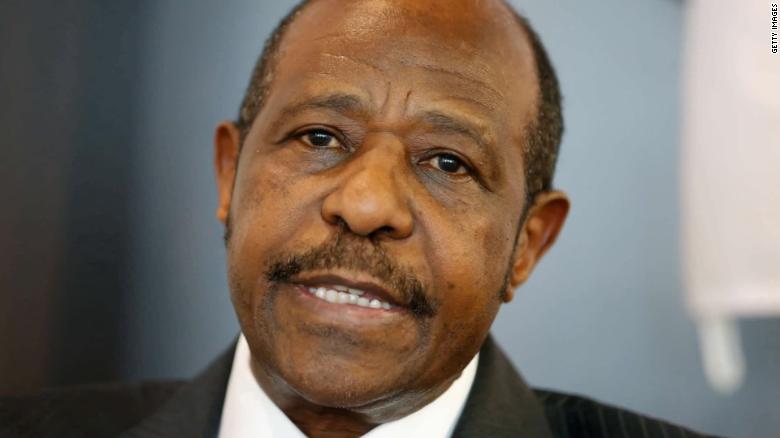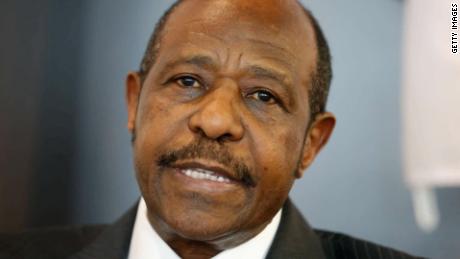Kagome kagomye ku Mana
Manga irengeje iya Nyamunsi
Kaje kamuje nk'imango
Imana y'i Rwanda karayitsura
Abana bayo barabatsemba
Karayihiga karayihinda
Ibura agaciro iva mu gicumbi
No mu mahanga ihabura icumbi
Intaho yayo irega uruhumbu
U Rwanda rwicara nta Mana
Amahoro meza arahondera
Ntaho byigeze biba i Rwanda,
Kabiba urwango rurasagamba
Aho rutabyutse karabibura
Mbese kagenza uko kabyize
Ruba gisaga igihugu cyose
Amahano ahabwa intebe arateka
Ntibyatinda aratekanya
Amahaze yose aratongora
N'amagomerane aratunguka
Urugomo rwimakazwa mu Rwanda
Abagome benda imigoma yabo
Karawukweta uwo kw'isonga
Umutekano ubwo uba uratetse,
Gakora mu nkaba ako gakoko
N'aho iguye karahakomba
U Rwanda rwose rugwa mu rwamba
Ingezi y'amaraso iradendeza
Irasangana u Rwanda rwose
Agakongori kagira ubwuzu
Karusha nkongwa mu misigati
Nk'iyi mwumva itsembye abantu
Karashyugumbwa ngo kayihute
Barazigaziga biracika
Kishe ab'inkwakuzi baratinya
Karabacika kwoga inyanja,
Gakoma akamo karavumera
Karavugishwa kavuza induru
Ubwiso bwako karabuzora
Kikoza hejuru mu kirere
Nuko kinihuramo kose
Maze kavogagiramo idogo
Kalidoga bishyira kera
Kibira kuburukira icyera
Kenda urwabya aho rureremba
Maze ruruzura rurasesa
Karahumiliza karoha mu nda
Urwabya n'ubunwa biba mahwane,
Inkaba yinjira mu nkanka
Mu ngoto haza kuba impatanwa
Agahogo kose igacamo inkora
Mu kada huzura umwisheke
Karahagahaga kaba agapira
;uko kiterura butosho
Kidunalika nko ku gasindu
Karakoresha imitara yose
Abambari bako bamara abantu
Barabacyemba baca ibihanga
Barabirunda u Rwanda rwose
Karema ingunda umuganaziko,
Kakabikunda byahebuje
Ukabona imbabazi zagasaze
Agatima kose ariho gatuye
Kabyegera kabyususa
Kabyuguga kabyagaza
Gakoma isazi ngo zitabyona
Izahaguye ni nk'umunani
Cyangwa ahari magana inani
Kakajya kanika kagasanza
Kakabilindura uko bukeye
Kakabiraramo ijoro ryose
Nka nyamatanga mu magi yayo;
U Rwanda ruhinduka urw'ibihanga
Rureka kwitwa urwa Gihanga
Kakabiratira ab'i mahanga
Ngo balilimbe ingesabihanga
Kanga kwitwa ingesabinyita
Ngo katabyukurutsa kalinga
Umwami akima bakagatanga
Bagashahura ikabishima
Maze igatamilizwa ibishahu
Ingezi y'u Rwanda igakamuka
Imitwe y'abantu igatureza
U Rwanda rukongera kuba u Rwanda.
Gacumu kacumuye ku mwami
Kakamuheza agahera ishyanga
Kakaba kigabije uru Rwanda
Kandi ntaho kabikomora
Kaje bukunguzi murabizi
Kambaye nta kirazira kazi
Umurage wacu karawupfobya
Umuterekero karawurenga
Kararutera kararutanga
Abanyamahanga bararutaha
Ruba ruhanzweho na shitani
Si ukubwagura isuka myambi;
Imyura isaga igihugu cyose
Inkingi zarwo zireka abashi
Cyilima aho ari aramanjirwa
Nawe Gihanga arajongorwa
Mungu mu ijuru arigunga
Imana y'i Rwanda igira ikidodo
Ako mu balyoko kalya karungu
Kararubaga kararubamba
Karujya mu nkoro kararwata
Umutima warwo kawurya isonga
Karawusenya urasandara
Ubusugi bwarwo karabusesa;
Rwose ruhinduka icyagane
Ruba nk'icyavu inyo zijagata
Cyangwa amashondwe yo mu itumba
Rushira abantu rushira ibintu
Rurashilira ruba umuyonga
Ruba nk'isayo yo mu gishanga
Rurahubangana rurahwera
Ruba umurangara w'amatongo
Inka n'abana biradogera
Incura n'incubizi n'ingwagwane
Karazitara karazitunda
Maze kalinikiza kalica;
Abakili mu nda karabavuza
Hamwe na ba nyina karavunga
Kenda impinja karazihwata
Ntikahaga karokera
Kajya mu bana karababaga
Inkumi n'ingimbi karaziketa
Naho ibikwerere karakemba
Naho abakambwe karabakinja
Maze gakinja aho mu ntumbi
Mu ishema Iyica kaba akaganji
Umujinya usaga akabiri kose
Uyu w'umuranduranzuzi mwumva;
Kazora ubwiso nk'akatewe
Buratutumba nk'utunyenyeli
Kagira icyaka cyinshi cyane
Karabuyera kaligunga
Kagira irungu kali mu bandi
Karazerera aho mu bikombe
Kagwa ku rwobo rwuje urwamba
N'uko kirasa nk'incira
Ni izoka yawe nta kigoye
Maze karunama karahuta
Abambari bako baca ibizinzo
Barakazinza baralilimba;
Ngo soma mwungeli w'abatsembyi
Mwami w'inkotanyi shira impumu
Iyo nkaba ishyushye ikuge mu bwonko
Ikabure ubwicanyi ube igikoko
Ugire ibikohwa amagufwa yose
Umubili n'uza umere amahembe
Ingusho yawe iguhore hafi
Ba intabikangwa mu gusogota
Niga abatutsi abahutu utsembe
Abatwa batware uko ubihaye
Soma usubire ili nkuba yesa
Inkuru irataha i kantarange;
Cyo ba ruhanga abahima bazi
Ni we batura niwe basenga
Ni we basingiza buli teka
Izina nk'iryo nilibe iryawe
Cyo hama rero ba impamakwica
Ukomerwe yombi uri nyir'u Rwanda
Umuhigo wawe uzawutanga
Ni amatezano ntagoye
Urwamba rwuzuye mu bisabo
U Rwanda rwuje ibisare rwose
Inkaba iratemba imitara yose;
Abahima impande bakaba injome
Ni abamenyereye kunywa amarege
Barakavomera karagonga
Bararumanga ab'inkongoro
Abandi ibyansi barabivika
Ibicuba byuzura bakajyana
Bakabitondeka ku ruhimbi
Kaba kaje bakagahemba
Biragahira karya ikiremve
Kaba ikirenga mu kumiraza
Kanga ayera bitaba i Rwanda
Ngo umwisheke ni wo ukabumba;
Mu ndiba humye baragakura
Ubukana bwica burakanuka
Maze bakuka imitima bose
Inkuba irakubita indi irakira
Ijuru lihinduka urwirungu
Hagwa urushyana rw'insangane
Icurabulindi iratongora
Babura u Rwanda babona urwamba
Rwose ruhinduka umwisheke
Baratabaza bishyira kera
Umwami w'i Nkole ntiyatinda
Arahutera agera ku ruzi;
Abona imirambo iharambuye
Yaremye uruzi rw'insangane
Imigezi imuzaniye ngo arebe
Irasukiranya igira urufaya
Akebutse hirya abona ni rwajya
Arebye hino abona ni rwaza
Asa ntumwaye aramwenyura
Arahumeka aliruhutsa
Arisihinga aho ku nkombe
Akanura amaso alikubira
Agira ubukiligitwa mu birenge
Maze akanyangabo karashyuha;
Agira amashyushyu ajya mu muhezo
Amara yo akanya ntibyatinda
Guhindura asa n'uhiga
Impande zose ahabona intumbi
Arashyugumbwa kuzagaza
Mu nda haza akanyamuneza
Umuhogo uhumuramo ineza
Umutima usaba ubugwaneza
Ubwuzu bwuzura mu nkanka
Alishimashima umutwe wose
Ubusatsi bwose burashilira
Asigara yanamye nk'igihaza;
Arahambira ajya ku ndengo
Ategeka abantu gutema ishyamba
Ngo ingeli bohereze mu Rwanda
Maze batwike izo ncandazi
Ejo batazamera nk'imyaka
Maze amagaju akabura inzuli
Barabatwika nk'amatafali
Barashilira baba umuyonga
Karawurunda karawuyora
Karawujyana no ku gitinde
Karawutega gasaba kwica
Ngo nta kindi kazi i Rwanda;
Ubu karakotana bunyamaswa
Abazima kabagize ingerere
Karabahumba ijoro n'umunsi
Abazimu kilirwa kabahiga
Karabashakira mu birere
Ibihuru byose karabivunja
N'ibihu byose ni uko nguko
Kamena ishyamba kakajya ishyanga
Ubwo ni ko kica igiti n'isazi
Umurage kazi ni uwo nguwo
Ngo iyo katishe karaburara
N'aho karyamye ni byo karota;
Aho kaba kikubye mu kirambi
Kaba karambije ku ntumbi
Kasa ubwinyo ukagira ubwoba
Karatombotse nimutinye
Ahubwo kaliliwe ntikaraye
Abagakunda nimutabare
Abatagashaka nimutakambe
Dore agahanga kalirenze
Ubuguru bwanamye mu mahanga
Agatima kumye ntikagitera
Ngaka kanamye ku gahinga
Kandi ni ejo si ejobundi;
Ubwo mu bashambo ni ibicika
Umwami w'i Nkole araca ibintu
Aliho aramashana n'ibyuma
Ashaka kwohereza mu Rwanda
Ntibyatinda biza bwangu
Bisasa intumbi aho mu mabanga
Imisozi isumba indi birayesa
Irenga hejuru y'imirambo
N'abagisamba birabazika
N'aho abasagutse bahwanye
Birabatunda birabatinda
Iyo mu misezero y'i mahanga;
Abahamya ijisho umuhima wawe
Araseka cyane aratangara
Ibisazi asanganywe birabyuka
N'uko abinjiza mu mihango
Imuha kwica nta gihunga
Amagufwa yabo ubu ni yo yota
Umubavu wabo ni wo umutunze
Ashyize kera yumva akantu
Ati aka gakoko naremye ubwange
Ibyo nagatoje karabitunze
Dore kalica katijana
Ni nka ka kambali k'akana
Alizibukira areba hirya
Abona abambali aho baganje
Bamwumvisha ko ali icyago
Biramucika aba nk'icyana
Balibwira barongera
Irya Gatonda aba aralitoye
Akazira icyatuma yitonda
No kwitonda akabyilinda
N'uko arongera arora intumbi
Uburyo azikunda byahebuje
Ahubwo n'iye ngo arayishaka
Urebye aririwe ntaraye.
Kavumwa kavumwe n'Imana
Kakaba imanga aho kuba imanzi
Ubupfura bwako bwarapfuye
Ubupfu bulinjira buraganza
Urupfu runena ako kantazi
Ngo imitsi yako ikura amenyo
Ariko rwashunnyeho rurumva
Ubupfunya bwuzura mu ngingo
Buragashusha kaba agashana
Kaba agashandiko k'agatabi
Ni akayonga si akayongwe
Ubu karayongobera butabi,
Iyo ukarebye si agatutsi
Usanga ahubwo ari agatindi
Nta mfura itwaza itsembatsemba
Nta mututsi utaba rubanda
Ngo ajye kubambura utuzu twabo
Utulima twabo atuvogere
Utuntu twabo adutsotsobe
Ahubwo ashinjagira gitware
Akajya mu rwego rw'intarindwa
Arasana ku nka bikamubera
Yagera ku ngoma akaba intwali
Ni uko Imana yabimuhaye,
Ntabwo yugaliza uru Rwanda
Ntaho byigeze biba i Rwanda
Ahubwo arwagura agana ishyanga
Imbaga y'umwami ikadendeza
Aniga abahinza akabirenza
Akavuga imyato ari umurenzi
Naho kaliya gahilihimve
K'agahilimbili k'i mahanga
lli shyano ryahabiye i mahanga
Ni agahuhu si agahungu
Si agahumbu ni agahombo
Ni agahangano bahanze,
Iyo kabaye harabawe
Abantu baho basa n'abera
Aliko mu nda ni umunuko
Umutima wa bo ntabwo wera
Itsembatsemba ni ryo gakondo
Ni abakwasi si abakonde
Umuco wabo ni uwo nguwo
Ngibyo rero ibyo katoye
Ni byo batunzi ni byo batozwa
Ni byo batota uturemwa twabo
Akambali kadutse ino mu Rwanda
Kinjiye kazanye uwo mugambi,
Kica abantu iyo ku nkiko
Gatuga abandi ngo bace ibintu
Karabasembura nk'amasake
Gaca amarenga karacunisha
Karabateranya bararwana
Imbaga nyamwinshi karayihenda
Karayiryarya karayibeshya
Maze kayanika ku gahinga
Ibura aho yagira iba rubebe
Abanyamahanga barayihana
lbura aho ihungira ibura byose
Imbaga y'umwami karayitsemba,
Ab'i mahanga barabireba
Maze barogeza nk'umupira
Barasakabaka barasizora
Ni ku magambi bazi neza
Ngo nibabambwe ngo nibabambwe
Ngo nigahore nta guhokwa
Kica abantu karabatsemba
N'abagisamba karabasonga
Abo mu mahanga karabacoga
Abatahaguye karabatunda
Ubu karagenda gatsotsoba
Kugeza umunsi kabatsembye,
Kaliya kambali k'amahanga
Ni agahanzi si agahinza
Iyo ukegereye ni akazingo
Ni urutambara rwishusha
Udusatsi twako ni udushingwe
Boshye umwana urwaye bwaki
Ubwonko bwako bwarasaye
Ubwiko bwiyendera uwo mwanya
Agatwe kako ni agatwero
Gaceka impanga zika ishingwe
Nta gahanga ni agahabwa
Naho ku twiso ni utunoli,
Utwinyo ntubaze ni mahuku
Utuboko twombi ni udukwege
Na ho ubuganza ni ubujanja
Nta gatuza ni agatuntu
Agatima kuzuyemo amasasu
Mu kada imbunda zirajagata
Udutako twako tw'inkobane
Duha uturundi nk'utw'icyoba
Na ho uturenge ni utunono
Gafite umwera umubiri wose
Ntabwo gahumura karanuka
Inkaba y'abantu ni yo ikaranga,
Aka kanyamaswa kamaze abantu
Ni agakoko gakokoye
Agatiligongo ni akaronko
Ni ubusabusa bwigenza
Ni agashishi urebye neza
Wagakandagira ukagenda
Wagatwara mu mano yawe
Kari mu myate ntiwabyumva
Uwo kadwinze ntarushya ihamba
Kazira ubwoko kagira ubworo
Gata ibitabapfu buri munsi
N'ubu wabona kahwase,
None rero mbaga y'umwami
Nimuhaguruke nimutabare
Aka kaburanka mugate hanze
Dore amahanga yagatanze
Ubugome bwako babubonye
Ikinyoma kazanye cyashaje
Bakavumbuye uko mukazi
Uko mukareba ntimwibeshya
Urugomo rwakagishiye mu nda
Maze rutwara umubili wose
Amagufwa yanamilije yose
Nimugahige nimugahoshe;
Nimuce hasi mukesure
Kabure hirya kabure hino
Nikajya hejuru inyoni zange
Nimugacengezemo inshinge
Naho amasasu ni ugusesa
Yemwe bakecuru mukibasha
Namwe babyeyi mutabyaye
Ntaretse abonkereje akaraga
Muvume rwamba rwishe u Rwanda
Bikongere no mu buvivi
Bisingire ubuvivure
No mubumwira bazabyumve,
Abacunnyi mwese nimwiyambe
Abahoryo mwibuke umuco wanyu
Abahennyi namwe ntimuhatangwe
Dore nyamunsi yayazoye
Ikuzimu bashitse byacitse
Ab'abagwasi babambye
Baragashaka ngo bagashoke
Kabuze amagiro byabaye
Inkuba zo mw'ijuru zasheze
Intare y'ishyamba irakirenza
Inzovu marumba yagakase
Imbogo y'inguge yagahwase,
Imvubu mu mazi irakigomba
Iyitwa nvara ikavovore
Inzoka zo munsi zirakadwinga
N'izo hejuru zateye
Impili izibanje imbere ikubira
Incira yarangije kugacira
Ahali wenda ubu kaciye
Iminsi iba myinshi igahimwa n'umwe
Ariko uwa none ni nyamujyana
Dore n'intunguru ku irembo
Igomba intumbi ibyo murabizi
N'inkotsa zose zakotsoye,
Si ak'ibihunyira mu mashyamba
Ruhaya yinjiye mu kiryamo
Rugeyo ishyamye aho mu kirambi
Dore akarambo impande yavo
Kunutse kumiwe ni umwunu
Cyo nimusandutse ayo maheru
Imonyo zirembe utwinyo twazo
Akaguta kako zikitere
Zinagature Kaguta kandi
Akabi karengane n'ilirenze
Umwami yime kandi aganze
U Rwanda rwongere rube u Rwanda.






